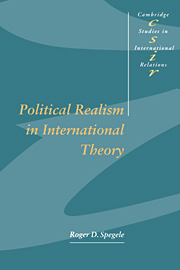Preface
Published online by Cambridge University Press: 30 October 2009
Summary
It would not be misleading to describe the contemporary situation within international studies as a philosophical problem of the sort described by Ludwig Wittgenstein in the Philosophical Investigations: ‘A philosophical problem has the form: “I don't know my way about”.’ The signs of international relationists not knowing their way about are just about everywhere: from the fragmentation attending the vast array of models, paradigms, approaches, conceptual schemes, research programmes, discourses (or whatever), strewn across the pitted surface of the academic study of international relations and wearily promoted by their creators to fevered calls for yet another debate conspicuously devoid of any indication of what the debate, au fond, is all about or even who is debating with whom about what. This study, by contrast, moves in a different direction: it deploys substantive arguments against identifiable rivals in defence of a genuine position - a somewhat different version of political realism which I call ‘evaluative political realism’. As we shall see below, evaluative political realism stands in sharp contrast to neorealism, on the one hand, and in somewhat muted contrast to commonsense realism, on the other. Evaluative political realism sees itself embedded in a tradition of realist thought which accepts, for now and any foreseeable future we are likely to care about, a world which contains cultural and national communities with radically different values organised into nationstates. Given the diversity of ideas and ways of life resulting from the articulation of these values, any political conception of world politics should, according to the evaluative political realist, be tolerant, democratic and pluralistic.
- Type
- Chapter
- Information
- Political Realism in International Theory , pp. xi - xviiPublisher: Cambridge University PressPrint publication year: 1996

